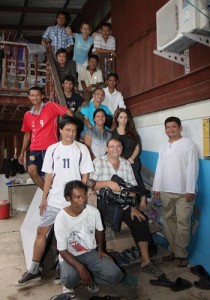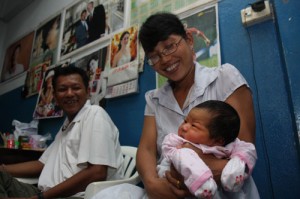Documenting Burma’s Firekeepers: An Interview with Filmmaker Jeanne Hallacy
by Elizabeth Hoover / May 13, 2011 / 1 Comment
In 1998, Bo Kyi was arrested for participating in the student uprising against the Burmese military regime. His interrogator told him that by the time he left prison he’d be “completely useless,” a shame to his family and broken by years of confinement and torture.
Far from being useless Bo Kyi has been advocating for Burmese political prisoners since his 1995 release. In addition to his humanitarian work, he helped create the internationally known Assistance Association for Political Prisoners. Bo Kyi has received prestigious international awards as the International Human Rights Defender Award, from Human Rights Watch, and the Elaine des Forges Award.
His story is featured along with those of other current and former political prisoners in Into the Current, a new film directed and produced by Jeanne Hallacy, an American filmmaker based in Bangkok, Thailand. Hallacy first traveled to Burma in the early 1990s to document child-soldiers there. A self-described “Burma watcher,” she has produced or directed four documentaries on Burma.
In this interview conducted via Skype, Hallacy discusses the dangers of filming in Burma, how compassion guides the pro-democracy movement, and what you can do to help political prisoners.
Your first documentary on the pro-democracy struggle, Burma Diary, was released in 1997. What has changed in Burma in the intervening 14 years?
Sadly, not much. Human rights abuses have exacerbated. There are more political prisoners now than in 1997. The regime wants to say that the 2010 elections have herald in a new roadmap to democracy, but it’s a dirt road to nowhere.
Has the pro-democracy movement accomplished anything in the past 15 years?
It’s hard to measure what the democratic movement has achieved. There are more than 2,100 political prisoners and that shows what they have achieved and what they continue to achieve. It shows there is resistance—non-violent resistance—that the regime deems threatening.
This is a long-term conflict in a country that has been under the boot of an extreme dictatorship—a half-century of nothing by military regime—and that inculcates itself into the culture and into the social realities of the citizen. Yet thousands of people participated in the Saffron Revolution, even though it meant they could be gunned down. Yet members of the media, writers, and artists have taken great risks to write, report, edit, disseminate information, as well create artistic works that challenge the regime and remind the people in of the strength and vision they still have.
Read Burmese Media Revolution by Silvia Duarte
The human rights abuses in Burma are very well documented. Why has never been substantial international intervention?
Why can we have a United Nations resolution for intervention in Libya, but not in Burma? Rape as a weapon of war, torture, arbitrary executions, illegal detention, people being used as human mine-sweepers, people being used as forced labor, child soldiers, half a million internally displaced, some 140,000 people living in camps in Thailand, and another quarter of a million in Bangladesh—why isn’t Burma a priority issue in the UN?
The UN has passed resolutions, but the regime has remained impervious, bafflingly so. They are so deeply ensconced in their own hyper-surreality of ruthless and paranoiac control that they have become immune to caring about what these UN resolutions might mean.
Why do you think they are able to remain so impervious?
They don’t need Western political approval or economic investments. They are more interested in maintaining good relations with Southeast Asian nations and China who have massively invested in the country. They can shrug off the sanctions because they don’t have an effect on the economy.
Hallacy, top center, with film crew and members of the Assistance Association for Political Prisoners
You maintain that Burma hasn’t changed and has no incentive to change, and yet they have released Aung San Suu Kyi from house arrest.
That’s why it’s so important to for Into the Current to come out now. It’s important for people to understand that despite the charade of the elections and the fact that they released Aung San Suu Kyi, they have done everything in their power to curtail her ability to perform her role as a recognized leader in the political process.
Aung San Suu Kyi’s party, the National League for Democracy was dissolved by the government after not participating in elections they viewed as lacking fairness and transparency. Despite this, Aung San Suu Kyi has used all of her energy and focus since her release to revitalize the process of democratic movement across Burma and continues to call on the newly elected government to enter into dialogue with the democratic forces and the ethnic leaders to find a political solution to the protracted civil war and gross human rights abuses. She has called for the immediate and unconditional release of political prisoners as a priority if the newly seated government wants to show its sincerity in the political process. She has met with ethnic leaders in Burma in efforts to move the call for tripartite dialogue forward. Her indomitable spirit based on metta enables her to tirelessly work for the vision of non-violent change in Burma.
In Into the Current activist and former political prisoner Bo Kyi remembers that during his interrogation, the interrogator kept asking his opinion of the military regime. He kept saying “defective government” even though his answer would mean years of imprisonment. What was it like to film those interviews with Bo Kyi and other former political prisoners?
It was inspiring to hear what they endured, but that is not the story for me because that’s something you see across the world: people enduring horrific cruelty from oppressive governments.
I wanted to portray not only that they have endured, but also that they continue to love. They never talk of vengeance and have completely let go of anger. In the film, Thet Oo, who is deaf in one ear because he was beaten so badly, says, “If we were depressed in prison it would be like they imprisoned us twice so we decided that we would walk out with our heads high and our chests out and be strong.” Ngwe Lin describes the electric shock torture he endured and he says, “Is it wrong to make people strip naked and crawl on the floor when all they’ve done is ask for democracy? Yes, but the only way we are going to move forward is to have dialogue.”
In the film, Aung San Suu Kyi speaks about metta, or loving-kindness. How has that concept informed the pro-democracy movement?
Aung San Suu Kyi is first and foremost a Buddhist and her politics emerge from that. Her resolve, acumen, and discipline all come from her Buddhist training. She spent years and years meditating in isolation, as many of these political prisoners do. Bo Kyi has also resolved to stand on the side of truth, even if the wind blows him down or a storm sweeps him away. This comes in part from his understanding of Buddhism.
Metta is the philosophical basis for their politics. It is a truly selfless love and it means to love another before yourself. So they feel compassion for the regime, because the regime is trapped in fear.
The film features a Burmese song about Nelson Mandela, the South African leader who spent 27 years in prison. What does Mandela mean for Burmese activists?
He is a role model because he endured all those years in prison and isolation, yet maintained his political convictions.
Bo Kyi says he was able to endure his solitary confinement in part because he reflected on Mandela. There’s a story in the film about how Mandela’s article “Long Walk to Freedom” was smuggled into him in pieces over weeks. After he read it, he had to eat it because it was contraband.
Is there anything your American audience can do on behalf on the political prisoners?
Right now there are around 150 prisoners-of-conscious who are in dire need of medical assistance. Poet and activist Min Ko Naing’s heart disease has progressed and he is being held in solitary without medical treatment in a prison his family can’t reach—another cruelty of the Burmese government is how they torture the families of the prisoners.
I encourage you to go The Assistance Association for Political Prisoners’ website to learn about it and to contact your congressional representative to demand for the immediate release of all political prisoners.
Bo Kyi, left, with family
There is some remarkable footage in Into the Current, including images from the Saffron Revolution that shows demonstrators gunned down by military police. How did you get that footage?
This is a co-production with the Democratic Voice of Burma and that amazing footage came from DVB and from my associate director Santhar Aung, who filmed it at huge risk.
Some of the footage has never been shown to foreigners. There is a scene were Min Ko Naing is at the funeral of his friend, who was also a famous poet. The comedian Zarganar is also there. Just going to that funeral put them at great risk because it meant they would be marked as dissidents. I am so glad we have this scene because all the people depicted are now in prison.
It’s hard to explain how scary it is to be out of the street hiding a camera and then lifting that camera to your eye to steal your shot, while you yourself are probably being filmed. One of the cameramen from DVB was just sentenced to 65 years in prison.
What do you hope this film will accomplish?
As a student Min Ko Naing spent over 16 years in solitary and what was his refuge? Poetry, creativity, truth. In a prolonged dictatorship, what happens to the psyche of the people is much more damaging that the obvious abuses. It instills fear and muzzles people’s spirit and creativity. What these prisoners do in their words and in their art is stir those embers and fan the flame to remind people that they have dignity and truth. That’s why I call the political prisoners, especially the artists, the firekeepers.
We want to inspire people with that and show people that whatever situation they are in, it is never insurmountable if they know they are doing something true and based on metta.
Read Elizabeth’s bio







One Comment on "Documenting Burma’s Firekeepers: An Interview with Filmmaker Jeanne Hallacy"
This film is a must-see. It portrays the humanity and the spirit of the political prisoners, their families and the whole of Burma in a unique, compassionate, fascinating and humbling way. Hallacy has that rare combination of film-making – a deep understanding of the facts of this reality combined with the passion and empathy to tell it. Rare footage makes this a real gem of a film too.